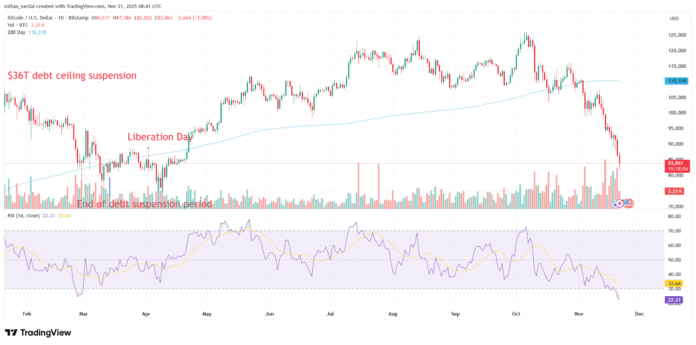Cryptocurrency Markets Decline: Understanding the Current State of Digital Asset Treasuries
The cryptocurrency market has experienced a decline for the fourth consecutive session this week, raising concerns about the status of the bull market cycle. According to a report from 10X Research, BitMine Immersion Technologies, the world’s largest corporate holder of Ether (ETH), is sitting on a cumulative unrealized loss of $3.7 billion on its total holdings. This significant loss has sparked investor concerns and highlights the challenges faced by digital asset treasuries (DATs) in the current market.
Markus Thiele, founder of 10x Research, notes that most DATs have suffered a decline in their net asset value (NAV), making it difficult to raise funds for new investments or attract new retail investors. This has left existing shareholders “trapped” with growing paper losses. The decline in NAV is a significant concern, as it affects the ability of DATs to expand their capital and investments.
BitMine’s $3.7 Billion Loss: A “Hotel California” Scenario
The report from 10x Research reveals that BitMine Immersion Technologies is currently in the red by $1,000 per ETH purchased, implying a cumulative unrealized loss of $3.7 billion on its total holdings. This significant loss has been described as a “Hotel California” scenario, where investors are trapped in the structure and unable to get out without significant damage. The complex and opaque fee structures of DATs can quietly erode returns, making it challenging for investors to exit their positions without incurring substantial losses.
The mNAV ratio compares a company’s enterprise value to the value of its crypto holdings. An mNAV above 1 allows a company to raise funds by issuing new shares to accumulate digital assets. Values below 1 make it significantly more difficult to expand capital and investments. According to data from Bitminetracker, BitMine’s base mNAV was 0.77, while its diluted mNAV was 0.92.
SEC Roundtable on Privacy and Financial Surveillance
The U.S. Securities and Exchange Commission’s Crypto Task Force has scheduled a December roundtable discussion on privacy and financial surveillance. The data protection roundtable is scheduled for December 15th and will bring together crypto industry executives and SEC officials to discuss common pain points and solutions. The renewed interest in privacy is a hot topic, following several developments, including the partial guilty verdict in the trial of Tornado Cash developer Roman Storm in June.
Privacy has become a significant concern, with many advocates suggesting the use of blockchain technology to address factors that contribute to poverty, such as reducing transaction times, eliminating or reducing fees, and improving access to financial services. The DeFi Education Fund notes that DeFi infrastructure could potentially save unbanked or underbanked people around the world around $30 billion annually by reducing remittance costs.
Coinbase Launches ETH-Backed Lending
Coinbase has launched Ether-backed lending for US users, allowing customers to borrow USDC against their ETH holdings without selling them. The exchange said the product is available in most US states except New York, with interest rates and liquidation risk tied to market conditions. Users can borrow up to $1 million worth of USDC (USDC) stablecoins.
Coinbase plans to expand the program to other assets, including loans collateralized by its staked Ether token, cbETH. The new product is launched in collaboration with Morpho, a lending protocol for decentralized finance (DeFi). According to Dune data, Coinbase’s on-chain lending markets have processed more than $1.25 billion in lending, backed by approximately $1.37 billion in deposited collateral.
Mastercard Uses Polygon to Convert Crypto Addresses into Simple Usernames
Mastercard is expanding its Crypto Credential program to self-custody wallets, allowing users to send and receive cryptocurrencies using verified username-style aliases instead of long wallet addresses. Polygon will be the first blockchain to support the launch, while payments company Mercuryo will handle identity verification and issue the aliases to users.
Once verified by Mercuryo, users can associate a human-readable alias with their self-managed wallet or request a soulbound token on Polygon that proves the wallet belongs to a verified person. This innovation aims to optimize wallet addresses and add meaningful verification, creating trust in digital token transfers.
DeFi Market Overview
Most of the top 100 cryptocurrencies by market capitalization ended the week in the red, according to data from Cointelegraph Markets Pro and TradingView. The privacy-focused Canton network’s (CC) token fell 32%, marking its biggest drop of the week, followed by the Story (IP) token, which plunged 29% last week.
For more information on the current state of the cryptocurrency market and digital asset treasuries, visit https://cointelegraph.com/news/bitcoin-rout-crypto-treasuries-reckoning-finance-redefined?utm_source=rss_feed&utm_medium=rss_tag_blockchain&utm_campaign=rss_partner_inbound

